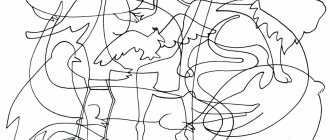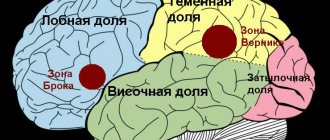The importance of the proper functioning of the human hearing system is very difficult to overestimate, especially when it comes to speech hearing. This type is responsible for speech intelligibility, and its violations are very, very common. As a rule, problems with speech perception initially appear in an environment of background noise, in a state of nervous tension, with defects in the speaker’s diction, or when talking on the phone. Impaired speech perception (phonemic regression) more often manifests itself when listening to monosyllabic words, but as for two and three syllable words, they are recognized by the patient much better.
Causes
Since speech perception is a complex process that involves the outer, middle, inner ear, auditory nerve and cerebral cortex, the cause of phonemic regression can be almost any disruption in the functioning of these structures.
- Lesions of the outer and middle ear usually cause reversible hearing loss. These injuries are associated with trauma or contusion leading to rupture of the eardrum; infections that cause swelling of the auditory tube and filling it with exudate; sulfur plugs.
- Damage to the inner ear that leads to deterioration in speech hearing is most often associated with damage to hair cells due to infection, noise trauma, age-related changes, or genetic abnormalities. Inflammation of the corresponding nerve also leads to loss of speech sensitivity, but these lesions are also accompanied by a general decrease in the level of audibility.
- In cases of disorders of the brain centers responsible for hearing (central disorders), tonal sound disturbances are usually not observed, only speech perception is affected. In adult patients, this pathology is observed quite rarely and is associated with cerebrovascular accidents, injuries, abscesses and brain tumors.
Cases of vascular dementia
Scientists have established for certain that the Russian writer, imperial maid of honor Smirnova Alexandra Osipovna, whom A.S. once admired. Pushkin, suffered from vascular dementia.
From her youth, she was distinguished by her gloomy mood or its swings, insomnia. At the age of 40, she suddenly lost weight and became haggard. I didn’t want to see doctors. She was treated on her own: sermons, rituals. Her heredity was burdened with mental disorders.
At the age of 69, her condition worsened further. Her speech became incoherent, she rearranged syllables in words and distorted them. Memory suffered and behavior was disrupted. The mental state deteriorated sharply, reaching the level of mental disorder.
According to data collected from eyewitnesses, Alexandra Osipovna was diagnosed with “atherosclerotic dementia.”
Another famous writer, the author of Uncle Tom's Cabin, Harriet Beecher Stowe, was also diagnosed with vascular dementia. She devoted her entire life to caring for her large family, fighting poverty and disease. In the last years of her life, after the death of her husband, Harriet lived completely alone. She exhibited strange behavior. Sometimes she came to Twain’s house and wandered around the rooms there. She didn’t pay attention to anyone, she was aloof. After walking around a bit among the people, she returned home. Her mental abilities had completely deteriorated, she practically could not take care of herself. The patient's memory underwent special destructive changes.
Symptoms
Patients complain of difficulties in perceiving speech, in particular, simple and similar-sounding words, while the overall level of hearing is not reduced. In addition, it becomes difficult to understand what is heard in conditions of noise pollution and in the absence of visual contact with the speaker. The perception of unfamiliar words becomes more difficult, especially in a foreign language.
If, in addition to problems with speech perception, the patient is bothered by symptoms such as dizziness, nausea, poor coordination of movements, difficulties with speech reproduction, then an urgent consultation with a neurologist is necessary.
How to maintain a healthy voice and normal speech
Here are some simple tips to help keep your voice healthy and strong for years to come.
- Reading aloud keeps your voice active. Do you like to start your day with a newspaper? Read aloud for 10-15 minutes every morning. It doesn’t matter to whom - your spouse, neighbor, pet or just yourself. This is a great way to train your voice daily.
- The voice is a reflection of our health. He will be fine when the whole body is in good shape. So be sure to stay physically active. Even something as simple as walking will improve your fitness and maintain your voice.
- The larynx should remain moist and elastic, so drink six to eight glasses of clean water a day. Limit caffeine and alcohol, which dry out your throat. Include grapes, melons, cucumbers and other vegetables and fruits that contain a lot of water in your diet. Use a humidifier, especially during the heating season, the recommended humidity is 30%. And, of course, don't smoke!
- The more you use your voice, the stronger it becomes. Be sociable and participate in the conversation. The worst thing you can do is isolate yourself and remain silent. But avoid shouting and loud singing.
Age-related voice problems can begin as early as 50 years of age. But even if there are no changes yet, use these tips. Just as physical training programs help keep your body strong, working on your voice will help keep it healthy.
Diagnostics
If the patient complains of impaired speech perception, the otolaryngologist determines the level of hearing using audiometry. The simplest method of audiometry is to check the level of speech perception at different distances and at different volume levels. The ability to hear a whisper at a distance of 6 meters is considered the norm. Audiometry using special equipment allows you to assess the level of tonal hearing. With phonemic regression, the levels of tonal and speech types differ sharply - tonal remains normal or decreases slightly.
To diagnose organic lesions of the apparatus, ultrasound is performed; MRI is recommended to study changes in the structure of the brain. When diagnosing central hearing lesions, an EEG is performed using sound stimuli.
general characteristics
Retardation is a slowness of mental and physiological processes.
In the scientific community, the terms “bradypsychism” and “bradypsychia” are used to denote it. The most typical external signs are slow reactions, protracted speech, inability to engage in joint activities or communication that proceed at a normal pace. Inhibited people often remain alone, seem unsociable, withdrawn for no reason. The most severe variants of the disorder are observed with apathy and stupor, when patients do not respond to anything. There are three types of inhibition: ideational, motor and complex. The symptom is called ideatorial when slowness is most pronounced in speech and thinking. People show moderate or slightly weakened motor activity, but when trying to carry on a conversation, inhibition occurs - they do not have time to follow the progress of the conversation, track the change in topic, or answer the questions posed. Others get the impression that the thought process and speaking take a lot of energy from a person.
Motor retardation is manifested to a greater extent by slowing down movements. It is characterized by physical weakness, relaxed posture, and incoordination. People constantly feel the desire to lean on something stable, sit down or lie down. The decrease in speech rate is mild; communication difficulties arise only when conducting an intellectually complex or emotional conversation. With complex retardation, the mental and motor spheres suffer: patients speak quietly, with long pauses, move slowly or remain practically motionless.
Treatment
For hearing impairment associated with infectious diseases or injuries, appropriate therapy is provided. Antimicrobial, non-steroidal anti-inflammatory (Ibuprofen, Diclofenac) and vasoconstrictor drugs (Naphthyzin, Otrivin) are prescribed. In most cases, surgery is not required for a perforated eardrum.
If the function of the inner ear is impaired due to damage to hair cells or contusion, nootropics (Piracetam, Nootropil, Vipocetin), B vitamins, antihypoxants (Trimetazidine, Meldonium, Actovegin), corticosteroids (Prednisolone, Celeston) are prescribed. Physiotherapy is used - pneumomassage and hyperbaric oxygenation.
Treatment of central hearing disorders associated with organic pathologies of the brain is carried out only in a hospital setting. If drug and surgical treatment are ineffective, rehabilitation therapy is recommended - selection of a hearing aid, and in most cases, after an adaptation period, speech perception in patients is restored.
The reception is conducted by specialists
Kirillov Evgeniy Sergeevich
Audiologist
Cost of services
Initial consultation with an audiologist
1200₽
Repeated consultation with an audiologist
1000₽
Types of dementia
Depending on the nature of its occurrence, two types of mental pathology are distinguished:
- congenital;
- acquired.
Congenital oligophrenia or, in other words, a non-progressive process is a pathology that occurs during the intrauterine development of the fetus or in connection with complicated labor of the mother. Its signs are observed immediately after the birth of the child. This defect in mental development is almost impossible to correct, but it seems possible to bring the intellectual development of such a person closer to established standards provided that timely and competent therapy is provided.
Acquired mental retardation is a type of pathology in which a decrease in the level of intelligence occurs during a certain period of a person’s life. Its characteristic feature is the progressive course of the disease, in which the development and increase in symptoms occurs gradually.
The following classification of mental disorder is based on the determination of the IQ, which the psychotherapist establishes using special tests. When diagnosing mental retardation in accordance with the degree of severity, experts distinguish between the following types:
- light;
- moderate (relative);
- heavy;
- deep.
A person who suffers from mild mental retardation is incapable of abstract thinking and has short-term memory. In this case, there is a violation of functional skills (for example, reading, writing, cooking, etc.). In social relationships with others, such people give the impression of being immature, so they are often subject to manipulation from the outside. When dealing with complex life issues and tasks, such a person feels the need for help.
A person with moderate dementia requires mandatory supervision. Unable to cope with everyday tasks, he needs continuous support from loved ones who are forced to carry out some of the patient’s responsibilities.
In the social sphere, the main tool of which is oral speech, the patient feels uncomfortable, his vocabulary is poor, so he often cannot correctly express his thoughts and demands. To form successful interpersonal relationships, an oligophrenic needs outside communicative assistance. In everyday, ordinary life, such people are able to develop certain skills and abilities solely as a result of persistent, long-term training.
Conceptual skills in people with severe mental retardation are limited and localized. They do not perceive the speech of others well and are not aware of such concepts as “number”, “money”, “time”, etc.
The patient's oral speech is limited and therefore consists mainly of primitive phrases and single words. Such people concentrate exclusively on what is happening around them at the moment.
A person with severe mental retardation needs to appoint a guardian who provides constant care and supervision (purchasing food and clothing, cooking, personal hygiene, etc.).
With a deep form of mental retardation, a person practically loses visual-spatial skills. For example, he can point to a certain object, but does not know how to use it for its intended purpose. The functional use of things is hampered by accompanying significant sensory and motor deviations.
The patient’s skills in terms of perceiving the speech patterns and gestures of others are very limited, which creates problems of communication in society. Such a person expresses basic desires and emotions using body language. At the same time, his consciousness is capable of perceiving only simple instructions. Such a patient is completely dependent and needs constant care.
Consequences of a stroke
There are transient ischemic attack (less than a day), minor stroke (from 1 day to 3 weeks) and stroke with persistent residual effects. The consequences of a stroke are expressed mainly in motor and sensory disorders, the formation of muscle contractures (pronounced constant restriction of movements in the joints), speech and swallowing disorders. General symptoms may also remain, including confusion, disturbances in thinking, will, and emotional regulation. Complications can develop: from epilepsy to bedsores, encephalopathy and anxiety-depressive syndrome [1, 3].
Signs of an incipient stroke
The onset of a hemorrhagic stroke is characterized by the following symptoms:
- severe headache;
- increased blood pressure;
- vomit;
- dizziness;
- loss of consciousness;
- weakness in the limbs;
- visual impairment;
- seizures [1].
The onset of ischemic stroke is gradual; within an hour, some of the following symptoms appear:
- facial asymmetry, numbness;
- difficulty speaking – incoherent, impaired understanding;
- double vision, visual disturbances;
- headache;
- numbness, limited mobility in the limbs, often on one side;
- dizziness, imbalance, staggering, staggering gait;
- confusion with disorientation, subsequently there may be loss of consciousness [3].
If one or more of these signs appear, you should:
- Sit the patient down, providing access to fresh air.
- Call emergency medical help immediately.
- If the patient is conscious and able to chew and swallow, give him one aspirin tablet.
The patient must be hospitalized in a neurological or neurosurgical department, where stroke treatment will be carried out. The sooner the patient is in the hospital, the more effective the therapy.
Prevention of strokes
Hereditary predisposition to stroke, the presence of cardiac diseases, pathology of blood vessels and blood composition, age over 40 years, obesity and diabetes require a number of preventive measures:
- Maintaining normal blood pressure, taking antihypertensive drugs as prescribed by a doctor, monitoring blood pressure.
- Maintaining a normal level of physical activity, exercise, walking 30-40 minutes a day (for example, walking the dog).
- Conducting preventive examinations, including a standard set of laboratory parameters. During a preventive examination, the following tests are additionally required: gene diagnosis of CADASIL syndrome using the PCR method, plasma factors of the blood coagulation system, antibodies to prothrombin of the IgG and IgM classes to determine the risk of thrombosis, determination of polymorphisms associated with the risk of arterial hypertension, diabetes mellitus, lipid disorders exchange, in order to identify a predisposition to diseases that increase the risk of stroke, von Willebrand factor (a glycoprotein that ensures the formation of blood clots), complex laboratory tests for preclinical diagnosis of cardiovascular diseases are offered (“ELI-ANKOR-Test-12”, “Cardiorisk”).
- Avoiding chronic and acute stress, maintaining mental hygiene.
- Normalization of weight (BMI <25 kg/m2).
- Healthy eating (for example, Mediterranean diet, limiting salt to 5 5 g/day).
- Quitting smoking and taking psychoactive substances.
- Treatment of diseases that are a risk factor for stroke [8, 11].







